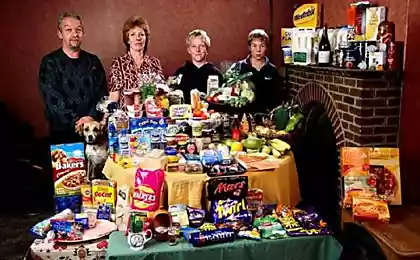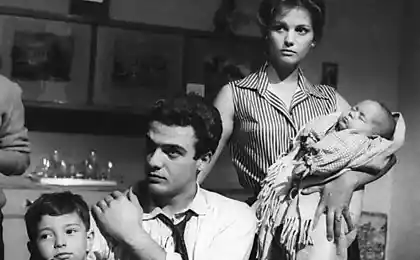634
How to create attentive family
High employment, electronic gadgets, long trips to work and home — all this leads to the fact that today family members are increasingly alienated from each other physically and emotionally. Stefanie and Elisha Goldstein, the parents of two little boys and the psychotherapists who work with couples, children and adolescents. Watching gradually destroyed family ties, they think about how to get the attention of family members to each other. Here are some tips from the magazine Mindful for those who want to make their family a more loving, happy, and attentive. Translation © Anastasia Gosteva
Twenty eight million eight hundred seventy two thousand three hundred eighty one
Today in our culture, there is an unprecedented shift: the members of the modern families is less close emotional ties with each other. Partners and parents and children are increasingly alienated from each other due to the high employment and the large number of distractions that modern society offers. Too many families during a family dinner, parents and children sit buried in their smartphones, instead of having to communicate with each other. We Express our love on the run, sound bits and short message “I love you”. It is easy to imagine that in the future such divided families will be commonplace, because our daily habits blind us and does not allow you to see all the opportunities, connections and wonders that nourish family life and make it rich.
Working as psychotherapists with hundreds of children, adolescents, adults, couples and whole families, we see how deeply corrodes family estrangement, and what devastating consequences it brings. And we saw a lot of families that simply gave up and stopped all attempts to restore the lost contact, because they were too painful and too difficult to change such deeply ingrained patterns of behavior.
All these observations have inspired us to try to develop principles and recommendations for those who want to make their family more attentive. We have engaged in this work not only to help our customers overcome the existing alienation or avoid its occurrence in their families, but also because they raise two sons three and five years. We wanted our own family had a lot of love, understanding, playfulness, humor, trust, and so our relationship was strong and stable, despite environmental factors. First of all we have the best aspirations and intentions. But then we encounter the first difficulties. And as we have repeatedly convinced by his own complicated (and sometimes VERY difficult experience) when those inevitable problems arise, the crane is inefficient to expect that the other realizes his mistakes and will change. Much more useful to start with yourself. That is why our first principle of creating a considerate family is to begin to educate its own “helpful Me”. This does not mean that you have to attend to the cultivation of some special “Me”. This means that you must start with yourself — and the first thing to pay attention to yourself. Then when both partners have done some work on yourself, naturally you need to shift your focus to the relationship in a pair, because it is rarely possible to maintain good relations on autopilot. Relationships need regular nourishment and development. And if all goes well, we are on the right path to give our children what they really need — because they will always look at us and imitate us. What they see in the family — how attentive we are in each moment — will have a much more powerful impact than all our talk about care. Attentive nurturing I Many years ago we were invited to meet the famous pediatrician and author of several books Brazelton berry (Berry Brazelton). Parents and professionals like us, we peppered him with questions about "how to behave and what to do" to avoid numerous daily difficulties that we face. At the end of this meeting, Brazelton said, "you Know, I sometimes believe that there is a huge amount of literature on parenting and child development, which is available to modern parents is not always to their advantage. Because they had a belief that they need all the time to consult the experts on all issues. While for the most part the answers are inside of them — they need only to listen to yourself. They always have the answers." We believe that attentive family occurs at the moment when we begin to look inward — when we learn to stop and freeze in the presence of a deep listen to themselves and trust their own wisdom. If we accustom ourselves during the day to find time to slow down, rest, pay attention to the condition of our body, our emotions and thoughts, we gradually train our mind to perceive a broader perspective. And then, even in the midst of emotional upheaval, we will retain the ability to more clearly see what exactly is currently need we ourselves and other people. If we pay attention, parenting is not the problem. Life is constantly sending us a variety of incoming data coming into our senses from a variety of sources. If they overwhelm us, our brain switches the mode of functioning on autopilot. And then we fail in our own children's emotional history, make quick, unconscious judgments, and react to their children and partners on the basis of these judgments. But if we pay attention we can pay attention to your breath, to stop and discover some sort of the big picture, and on the basis of it to make more healthy decisions. Due to the fact that our life becomes incredibly stressful and hectic, we are easily susceptible to mechanical and painful impulsive reactions, often inherited from our own parents — though almost we all once swore to myself that our family will definitely be different. As a result, we feel terrible. We feel shame and begin to consider themselves "bad parents" or "not good enough parents." If we accustom ourselves as often as possible during the day to do a careful pause at least for a few moments, we begin to gradually notice these mechanical reactions. And then we have the chance to connect with ourselves, with our partners (if we have them) and our children. As parents we are all imperfect. We found that one of the most important practices is the practice of development of compassion for themselves — especially in high-stress situations. When we become aware of the moments in which we are struggling, we can help yourself, treated yourself kindly and with understanding. There are many short practices that teach us mindfulness of the moment: how to stop, to pause and to expand the perception of what is happening. We suggest you to use any that you like. We also advise you to learn to trust your inner wisdom as a parent. And here is another practice, which we often use with our clients and in their own lives. Practice
Care and compassion for yourself
When you notice that this is a difficult situation that you are in tension, realize it and admit what is happening. Don't pretend that everything is under control. Say: "I am now hard". And then ask yourself: "what I need right now?". Recognizing what is happening and asking such a question, we open to your inner wisdom and begin to trust ourselves. You may find that you would like to have a lot of patience or not experience such a strong emotional tension. Try to put your hand on your heart, as a sign of care and acceptance. And say to yourself: "Let me become easy. Let me be more patient and less emotional tension." (You can wish for anything you want — clarity, peace, ease, joy, love, etc.). If you want, you can go a little deeper. Once you wish yourself everything that you now miss, can you imagine all those parents, which now also has a hard time (and the world enough), and wish them with all my heart the same. We are all connected to each other in this imperfect parent journey. And if we are willing to admit it, it is easier to stop judging yourself and open up to what's really important at the moment.
Seventy million four hundred sixty thousand two hundred ten
Raising a considerate couple We, like most parents, there were times when our relationship started to fade and weaken. We feel irritable, restless, we longed to understand each other and meet again. But instead to find refuge in each other, we numb and distract ourselves with TV, work or a glass of wine. And, of course, none of this was not able to satisfy our longing for each other and for love. No matter if you are a partnership, has just completed their or, on the contrary, are in search of a life partner, nurturing your resolve to nourish and to maintain an open loving relationship, you are laying the Foundation of his own health and happiness. Relationship — is the same living being as man. They need attention and nutrition as well as our body and mind. But what is the best food for relationships? What kind of attention they need? Social psychologist, researcher and writer Barbara Frederickson (Barbara Frederickson) recently gave strikingly thin definition of love: "Your body learns how to love through the micro-moments of intimacy shared with another person". And this is entirely consistent with our own experience. Every day gives us many opportunities for creating and living with each other such micro-moments of intimacy, but if we fall into the trap of routine and see each other as a static, immutable objects, we're missing all these points. We miss the opportunity to really see the other — with all its strengths and weaknesses, its beauty, joy, triumphs and failures and suffering. When we finally do see another, we share with each other our humanity, in all its diversity. Creating micro-moments of intimacy, we protect your relationship from collapse, which permeates quietly, like rust, and save your love. In fact, these moments is love. According to numerous studies, when we pay attention to these micro-moments, the inevitable life stresses affect us much less influence. Then the old emotional triggers are activated much less, and as a result we become much more happy individuals, partners and parents. Perhaps you find it hard to believe that such moments in a positive and confidence proximity actually can support us in this difficult time for our couple relationship and the times but it's true. Love is constantly renewed energy source, and this source is present even in tiny, tiny moments of intimacy. PracticeCareful micro-moments of intimacy Agree with each other that you will begin to find time for at least one micro-moment of intimacy a week for conversation and being physically present with each other. If at first you have any fears or condemnation, which are the result of a previous painful experience, just check them again and remind yourself about your determination to learn to be truly open and intimate with each other. Please note that you feel when you, for example, just sit beside and hold hands or hug easily each other. Allow your bodies to relax completely — this means that your nervous system has calmed down. Be aware of every moment together body sensations, feelings, thoughts. If you want to prolong these moments, allow them to last as long as both of you will be easy and comfortable.
Twenty three million eight hundred forty five thousand five hundred seventy six
Careful nurturing of the child (and parent)
Small children are always in the presence. They are fully open to their experience, and therefore, as a rule, they don't need help to feel the moment. But as vozrozdenija the complexity and diversity of social experiences, school demands and distractions of modern technologies are beginning to play a significant role in their lives. And then they, as adults, need help to begin to return to yourself, to your own feelings — consciously and with compassion.
Will they be able to do it in great measure depends on what they have learned from their parents over all the past years. Therefore, it is impossible to separate the careful upbringing of the child from the education of careful parents. We are constantly, often passively, unconsciously, to teach our children care or, conversely, carelessness. Children mostly do not learn what they are taught specifically, and the fact that they are constantly watching the natural for the parents way of being in the world. And then, if we forget that our words disagree with our way of life, it is useless to urge children to become vnimatelnymi, responsible and compassionate adults. If during a conversation with the child and answering his question you constantly glancing at your phone, you teach him what to listen to the interlocutor it is not necessary. If you are overworked, stressed and yell at the driver who you just “clipped”, you teach your child that aggression is a worthy and acceptable answer to a misunderstanding. If you stop to help a passer-by to collect things from fallen bags, you teach your child to think about others and help him to meet you with empathy and compassion. When you are ready to talk openly about emotions — both his and your children and treat yourself and the kids good-naturedly in spite of the problems, you give them an example of emotional intelligence and a caring attitude. There are also more active ways to teach our children care. Encourage, not force — your task is to sow the seeds. For example, you can teach them to be attentive to their emotions. Even if your child is only two years you can begin to acquaint him with the awareness of their own emotions when he's upset or happy. So it lays the Foundation of emotional intelligence. In practice, this means that you help the child identify what emotion he's feeling right now, give it a name, and notice where it manifests in the body. And then in the future he can easily do it yourself. But it will take time before your child will get used to treat their emotions consciously, so often, remind yourself — you just plant the seeds! No violence! Do it slowly and be attentive to your own emotions: how you feel right now? What do you think your child feels? “Respiratory drug” — another wonderful practice that uses a huge number of psychologists and educators working with children and adolescents. In our program, CALM (“Bringing adolescents to learn mindfulness”), we successfully applied this practice to children of all ages. It is very simple and you can try it right now with your kids. PracticeRespiratory friend This is a fun practice that you can do as a family. For toddlers and younger students perfect stuffed animal made of cloth, stuffed with some pretty heavy material. For teenagers can be useful, smooth river stone. It is their “respiratory drug”. All lie on the floor, everyone puts themselves on the stomach breathing other, and watches as it rises and falls with each inhalation and exhalation. You can invite all of you to count from one to three on the inhale, and then from three to one on the exhale. You can teach children to use this practice as a tool in stressful situations — for example, if they are too anxious before the test tomorrow or overexcited due to the tense altercation with one another. For kids it is often useful to come up with some story about their respiratory other to motivate them and to involve myself emotionally. Conclusion The most significant moments in our lives happen when we turn down the tempo and tune to very simple things. It's not always easy — because we have so many important things! but when you still stop and begin to notice moments of the present, it changes the quality of your relationships with partners and children. This helps family members be aware of their emotions in times of trial, creates a space for fluidity, flexibility and creativity, it teaches us to be thankful for, develops empathy and compassion. When we learn to experience gratitude for all that is good in our lives, and compassion in difficult times, we are becoming more open to reality and less to live on the machine. Remember — creating a considerate family is a process, and you won't always be perfect! If you go astray — forgive yourself. And then at that very moment you will make an amazing discovery — you can always start over. You always have a choice, and it is an important part of our lives. Source
Source: /users/1081























